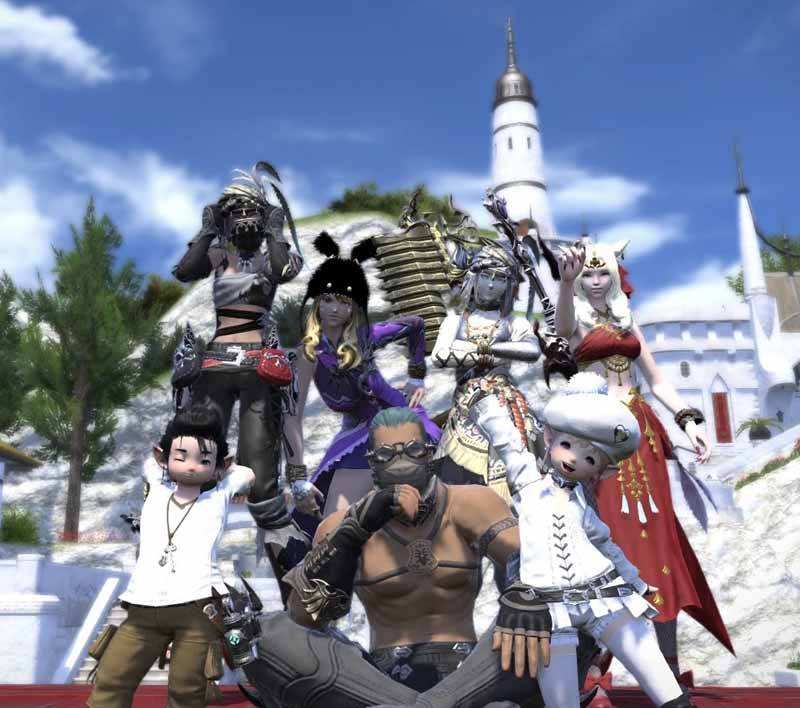On this day two years ago, a handful of my friends and I started our free company in the famous MMORPG Final Fantasy XIV. FFXIV’s answer to the online guild is a free company: players can build a community, recruit new players, and progress together.
Months prior, we had bore witness to numerous friends turning against each other, poor leadership, and guild politics we wanted nothing to do with.
When I left, I felt disheartened over losing friends I thought I could trust, and I wanted to believe there was something better than that in online gaming. That experience showed me exactly what I didn’t want in a guild, which happened to be the key to discovering what I wanted.
Two years later, I have a community of nearly 90 members that is still going strong.
If you’re considering starting a guild and want to build a resilient community, you need an action plan. Here is what I’ve learned after starting and running a guild for the past two years.
Tip #1: Start with a vision

Do you know what you want in a community? This is an important question because if you can’t answer it, you won’t have a clear vision of what you want your guild to be, and without that vision, your leadership and community won’t have direction.
Starting with a vision allows you to lay down a solid foundation for your community before it even begins. It begins by deciding what is most important to you in your game. Maybe you’re a casual player who likes spending time with friends goofing off. Or perhaps you are a hardcore raider and get a rush from clearing the most challenging content in the game with your teammates.
The essential part of my gaming experience is the people I spend time with. I can play any game alone, so my biggest priority in an online game is finding a great community of people to play with.
I desired a close-knit community that felt like a family. I wanted friends who respected me regardless of whether they agreed with me on something. It’s important to me to invest in people who also choose to invest in me – people who are team players and are happy for my personal growth and progression, even if it doesn’t benefit them.
The vision I had started with these simple wishes and grew from there.
Tip #2: Pick a guild name that represents your vision.
Many people overlook this step when creating a guild, but I think it’s essential. Your guild name is the first thing any potential recruit will see. As such, you want it to represent your vision for your community. Any Joe Schmo can start a guild and name it “Proz b4 Hoez”, but if that name doesn’t match your guild’s image, then the people who are attracted to it and join will likely be disappointed and leave. Or worse, they will stay, and nobody will be happy.
Pick a cool guild name, be memorable, and even make it funny if you want – but make sure it’s not at the expense of being relevant.
When choosing a name for my guild, I started with a list of names I liked that fit my vision for the guild and then narrowed it down to two. From there, I asked my friends who formed the guild with me which of the two they identified with. We settled on “Wild Hearts” because it represented our desire to build a close-knit family of free-spirited friends.
Tip #3: Be clear about rules and expectations.
It has been my experience that if a guild doesn’t have rules in place from day 1, then members don’t know what is expected of them. Leadership that doesn’t have expectations for their community to follow will not handle arising conflicts well. And trust me, there will be conflict from time to time.
Figure out what kind of rules you want in place before you start a guild. It doesn’t have to be complicated. This goes back to tip #1 with, knowing what you want in a community. Put guidelines and rules in place to help you foster the kind of community you want from the start, and everyone will be much happier.
Tip #4: Create a guild website.
Starting a guild without a website is a huge missed opportunity. Although a guild website is technically optional, it gives you a place to talk about your guild vision, display rules, ranks, and member rosters, and schedule things within your community like raids and special events.
Every serious guild I’ve been in has had a website, so it’s worth the initial investment to get one set up. It also gives potential recruits a good idea of what to expect from your community before joining.
There are a lot of guild website builders available, some free, some premium. I won’t go into too much detail now, but if you’re interested, you can click here for my review of the best guild website hosting services.
Tip #5: Build a leadership team that you trust.
I keep my leadership team small because it’s a numbers game. Having fewer people with power reduces the risk of someone abusing that power. The fewer involved in the management of the guild, the fewer disagreements there will be on how things should be run, and so on.
I have two co-leaders with whom I trade off the responsibility of running the guild every month. This serves two purposes:
- It gives me and my co-leaders and a break if one of us is too busy, tired, or stressed out to handle the day-to-day management of the guild
- Leaders don’t have ample time to let power go to their head
My co-leaders are people I trust implicitly, not just as friends but as vital members who understand the vision and core principles of the guild. One of them even co-founded the guild with me when we started.
When appointing co-leaders and officers, I look for members who have proven they will go above and beyond to invest in my guild before I ever offer them the position. I promote based on necessity and to reward those who have proven they are trustworthy and have the entire community’s best interests at heart.
Once you create a guild and it begins to grow, try to appoint leaders that play at different times throughout the day so that new recruits always have access to someone who can help them if a question arises.
Tip #6: Appoint new members an introductory rank.
Regardless of how many rank tiers you have, I highly suggest setting one to be a short-term introductory rank that is given out to all recruits. This allows you to restrict permissions to things like the guild bank and inventory from just that one rank and keeps the valuable things you and your members work hard for safe until new members have proven trustworthy to access those things.
I go a step further and restrict everything for introductory ranks for up to 14 days.
The way I see it is if a new member comes into my guild feeling entitled to the same things that veteran members are, then they are likely not team players and care more about their wants and needs than the community. If they aren’t willing to earn their place, they aren’t a good fit for my community. Restricting everything weeds these players out from the start, as they typically won’t stay long when they don’t get their way.
How much you choose to limit is up to you.
Tip #7: Starting and running a guild is A LOT of work

I’m going to be completely honest with you right now: starting a guild and maintaining it is a ton of work and not something to be taken lightly. When building a thriving community, you have to find new people, weed out the bad ones, communicate with your leadership team and members regularly, help members with content, answer questions, and deal with conflicts that arise.
As the leader of my free company, I know my member’s struggles. I know their relationship problems. I know their health issues. I know what jobs they have, what they are studying in school, and what they want to accomplish. Not every guild has to get this personal – as I said, it depends on what is most important to you.
But make no mistake – even if you delegate most responsibilities and keep one-on-one interactions to a minimum, running and leading a thriving community takes significant time and personal investment. Without that, I can almost guarantee it will fail.
Conclusion
Starting a guild requires a lot of work and time invested, but taking the time to define your vision, picking a guild name that represents you, setting up a guild website, and recruiting awesome members to build a community that you love is one of the most rewarding things you can do in an online game.
It’s not easy sometimes, but it’s worth it. I’ve met some of my best friends through the formation of my guild, met up in person, and cultivated lasting relationships that I wouldn’t trade for anything. With a bit of elbow grease, you can do the same!
Here’s to another year, Wild Hearts! Will you join us in creating a successful guild?

